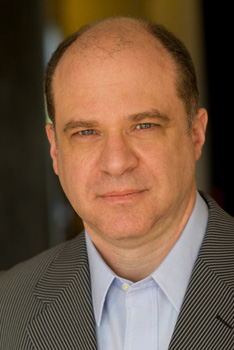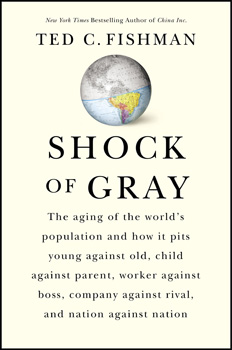We’re living longer and healthier lives, but an increasingly older population means an increasing pull on government entitlement programs: Social Security, Medicare, long-term care, public pensions and other financial-support programs are heavily burdened systems that can bring down the economy.
Today, people age 50 and over comprise 24 percent of the U.S. population, while 17 million Americans are between the ages of 75 and 85. By 2050, that number will likely reach 30 million, according to the National Institute on Aging. A new analysis on global aging from Standard & Poor’s indicates that “no other force is likely to shape the future of national economic health, public finances, and policymaking as the irreversible rate at which the world’s population is aging.”
To explore the economic consequences of our graying new world, The Fiscal Times spoke with Ted Fishman, whose new book, Shock of Gray (Scribner, $27.50), plumbs the topic of aging populations through profiles, analyses, interviews and other detailed reporting.

The Fiscal Times (TFT): What’s your biggest economic worry about an older American population?
Ted Fishman (TF): The promises we’ve made to ourselves on pensions and health care. It’s a very big issue. It seems insurmountable. But other countries have created solutions that offer relief by deciding how to triage their resources. One choice we’re going to have to make: Accept less in our early old age, or pay more.
TFT: Can we really make that choice in this country?
TF: I think we will.
TFT: Why?
TF: It’s that old rubric: What you can’t support will not stand. There will be a reckoning. Just in New York State alone, public workers have been promised more than $200 billion in unfunded health benefits, according to a recent report. Some of these commitments are very hard to re-jigger because they’re written into state constitutions. There’s pain coming. When people see that the schools really have to make do with less, that our roads have to get by with less, that when you turn on the water, it may not be the kind of water you want – then we will act.
people and economically valuable older people.
TFT: Does this mean less money in the pockets of older Americans – less than they’re already anticipating?
TF: The question becomes, how do you keep an older population motivated to stay as vital and valuable in the economy as it possibly can? There is a big difference between able older people and economically valuable older people. We have to get a message out, that you are obliged as a citizen to keep yourself sharp in the workplace for longer. We have savings plans that encourage people to save for the education of their children, but there ought to be a formal apparatus for putting money aside to keep your skills honed and up to date. We can do it structurally, the same way that we encourage people to save for their children’s college educations.
is outliving our money.
TFT: Won’t a real cultural shift be required?
TF: Yes, but sometimes shifts come about when you change the structure. When you give people incentives so they can be better earners over a longer course of their life, I think they’ll respond. People who are healthy and entering their 50s face the prospect of being retired nearly as long as they worked. That’s a very long retirement. It will be terrifying, because our greatest fear is outliving our money. People will want to prepare to renegotiate that, so that they can work longer and stay sharper longer. But some people just won’t be able to do it.
TFT: And some won’t want to, period.
TF: There are always people who will want to have the economy on their own terms. But the economy will tell them otherwise. Either they’ll live off the money they have, or in drastically reduced circumstances. That’s their choice. The choices are changing today.
TFT: Let’s talk about how workplaces will evolve with the aging of the population.
TF: They’ll respond in any way they can to make the most money out of this population. There’s nothing we can do to make employers more generous, more understanding – they’re not going to act charitably toward an older population.
TFT: How so? Isn’t it in their interests to do that, in some cases?

TF: They’re going to use an older population the same way they use all their workers, which is to maximize productivity and profit. If we look at the countries that have aged ahead of us, particularly in East Asia, we see a very stark trend in which the nature of work in later life has changed dramatically, from full-time salaried work for a good income, to contingent work, part-time, contract work with no benefits. For a lot of businesses, this works brilliantly to drive down the pay of older workers. And it also incidentally means that older workers have to work longer, because they’re working for less.
TFT: Many may have pensions or pay packages from previous employers, so they’re double dipping in some cases.
TF: Yes, which in some ways underwrites the low-wage elder economy. This definitely needs a solution. Do you create a vast baby boom work force that late in life can work for the price of teenagers, because they’re underwritten by Social Security or by pension savings, while teenagers have to live on a competitive wage that pits them against these older workers?
TFT: In your book you say that ‘the complaint that society ignores older people will soon be an absurdity.’ Why?
TF: Because too much of society will be older people. Daily life will mold to the contours of an older world, and our instincts and generalizations about older people will often guide us. Also we cannot demonize the older population, because one day we, too, will pass through that stage. This unifies us more than it divides us.
TFT: Your book shares a positive message about living longer and healthier lives.
TF: Yes. We cannot deny we’ve made progress. We’ve given ourselves the great gift of longer life and better health. So anything we face in terms of the challenges of dealing with this does not outweigh those benefits.





